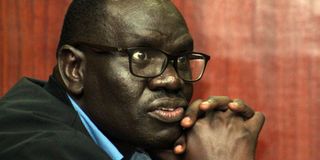How ex-KPC bosses evaded prosecution for five years

What you need to know:
- The trio will be charged with abuse of office, making a false document and willful failure to comply with laws relating to procurement.
- Their prosecution could now open the door for Mr Mbarak’s office to pursue the other 126 cases that collapsed in 2017.
After five years and two failed attempts, the Ethics and Anti-Corruption Commission has now gotten the green-light to have former Kenya Pipeline Company (KPC) CEO Charles Tanui and two ex-managers prosecuted over a procurement irregularity that benefited a local firm, Redline Limited.
Two previous attempts by the EACC to charge Mr Tanui, Elias Maina Karumi and Josphat Kipkoech Sirma in 2015 and 2017 failed after a technical hitch on the anti-graft watchdog’s board constitution and a Director of Public Prosecutions order to conduct further investigations.
KPC at the time needed three auto-transformers and the state corporation hired France’s Agecelec to bring the equipment to Kenya, install and commission them.
Investigators would later find that Redline Limited received Sh30 million for the transformers, before being paid another Sh973,912 in installation and commissioning fees.
Documents provided to KPC and approved by the three bureaucrats, indicated that Redline had done sourced, imported, installed and commissioned the equipment.
But Redline was not mentioned anywhere in the tendering process, which means that there was a procurement anomaly.
Under procurement law, a contracted company must seek permission before subcontracting or altering operation terms of the deal.
EACC detectives believe that Mr Tanui, Mr Karumi and Mr Sirma colluded to ensure that Redline got paid despite not having done any works.
The sleuths argue that the three helped in forging documents to show that Redline Limited had done a good job and ensured that they got a cheque.
The three were initially charged in 2015 and released on bond.
At the same time, former Transport minister Michael Kamau was also facing prosecution over malpractices involving collapsed Moi-era contractor Kundan Singh International.
Mr Kamau sued to quash the EACC investigations, arguing that the anti-graft watchdog did not have the minimum three Commissioners required to make decisions at the time he was charged.
The Court of Appeal agreed with Mr Kamau in 2017 and tossed the EACC investigations and prosecution plans. The ripple effect was that 127 graft cases, involving Sh17 billion in misappropriated public funds, all collapsed.
The KPC trio were among beneficiaries of the Court of Appeal decision as then DPP Keriako Tobiko was forced to withdraw all 127 cases.
A year later, the EACC now properly constituted, submitted an investigation report to Noordin Haji, who had taken over as DPP.
But Mr Haji asked the EACC to tighten what he felt were loose ends that would stop his office from securing a conviction.
Yesterday Mr Haji, now satisfied with the latest probe report, gave the EACC to arrest and process Mr Tanui, Mr Karumi and Mr Sirma in preparation for prosecution.
Mr Karumi and Mr Sirma were arrested shortly afterwards, but Mr Tanui could not be immediately traced.
EACC CEO Twalib Mbarak has now directed Mr Tanui to surrender himself to officers at the Integrity Centre.
“The EACC established that a total sum of Sh30 million was paid to M/s Redline Limited using false documents whereas the items were never installed, tested or commissioned as per the contract agreement,” Mr Mbarak said.
The trio will be charged with abuse of office, making a false document and willful failure to comply with laws relating to procurement.
Their prosecution could now open the door for Mr Mbarak’s office to pursue the other 126 cases that collapsed in 2017.





